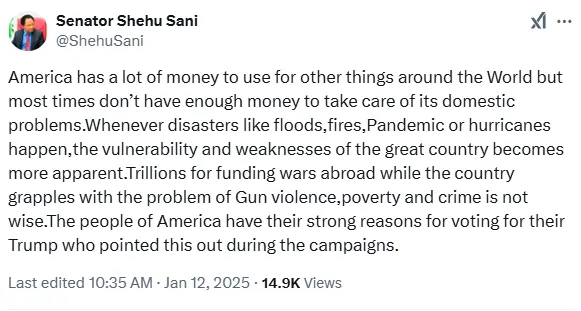
Senator Shehu Sani Critiques America’s Budget Priorities: Domestic Neglect?
Senator Shehu Sani, a Nigerian human rights activist and former lawmaker, recently commented on the United States’ allocation of funds, stating: “America has a lot of money to use for other things around the World but most times don’t have enough money to take care of its domestic problems.”
This perspective aligns with ongoing debates about U.S. federal spending priorities. Critics argue that substantial funds are directed toward international aid and military engagements, potentially at the expense of addressing pressing domestic issues such as infrastructure, healthcare, and education.
For instance, the U.S. has historically allocated significant portions of its budget to foreign aid and defense. In fiscal year 2020, the U.S. spent approximately $51 billion on foreign aid, representing about 1% of the federal budget. Additionally, defense spending accounted for about $714 billion, or 11% of the federal budget. In contrast, domestic programs such as education received $72.8 billion, highlighting disparities in funding allocations.
Proponents of substantial international spending argue that such investments promote global stability, economic interests, and national security, which indirectly benefit domestic well-being. However, critics contend that prioritizing international expenditures can lead to underfunding critical domestic programs, exacerbating issues like poverty, inadequate healthcare, and deteriorating infrastructure.
Senator Sani’s observation contributes to this discourse, emphasizing the need for a balanced approach that adequately addresses both international responsibilities and domestic challenges.
In Nigeria, Senator Sani has been vocal about governmental priorities and resource allocation. He has criticized the lack of transparency in lawmakers’ allowances and the mismanagement of funds intended for constituency projects. For example, he revealed that Nigerian senators receive substantial monthly allowances, which sparked public outrage and discussions about the ethical implications of such payments.
Furthermore, Senator Sani has highlighted issues within Nigeria’s foreign missions, pointing out their dysfunction and the government’s failure to adequately fund and maintain them. He argues that this neglect reflects a broader pattern of misallocation of resources and misplaced priorities within the Nigerian government.
These critiques underscore Senator Sani’s broader concerns about governance and the need for greater accountability and transparency in the management of public resources, both domestically and in the context of international relations.
In summary, Senator Sani’s remarks about U.S. spending priorities resonate with broader discussions about the balance between international commitments and domestic needs, a theme that is also pertinent in his critiques of governmental practices in Nigeria.

